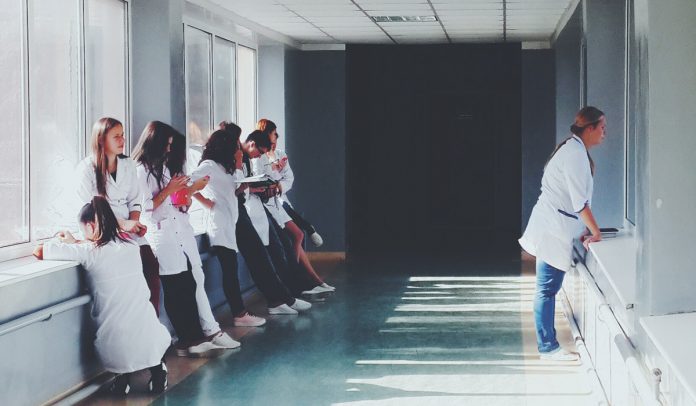THERE has recently been a move to bring medical education under a centralised umbrella.(1) With this comes a move to increase the powers of the Australian Health Practitioner Registration Agency, expanding it from just regulation to medical education.
The rationale appears to be aimed at standardising medical training, with a view to reducing aspects of medical education to common denominators that can then be used to justify training people who are not doctors to do jobs that doctors currently do, fragmenting medical training into small parts.
This is an exercise in cost reduction, which undermines the current central role of the doctor in providing medical care. It will not work because it is not dealing with the root cause of why we are in the state we are in.
I understand why people who are not doctors would think that fragmenting medical education and care could be a good idea. They see doctors providing the same services over and over and think that other people could be trained, in a shorter period of time, to do each one of these services. Therefore, they might be persuaded to provide the service for a fraction of the cost of a doctor, especially as the government will be paying the bill and this will be their only way of making a living from it. Rather like a factory conveyer belt, only the commodity is people.
As the demand for medical services has risen, appointment books have become more crowded and operating lists have grown longer to try and meet that demand. Looking from the outside, it may seem logical to think that these new recommendations would be a reasonable next step.
The trouble with this way of thinking is that it fails to take into account the fact that medical care is already too fragmented, and this fragmentation has come at a cost, particularly to the patients for whom we care. If anything, we need to move back to restoring medicine and medical education to its true whole, rather than looking to fragment it further.
At present, the family doctor is the one who holds all the fragments of medical care together for our patients. They refer to the specialists, coordinate all the information from the specialists, translate what the specialist said in two minutes back to the patient, and care for the patient as a person, making sure they are not missing the forest for the trees. Of course, this essential role is also being undermined due to the pressures of time and money, with doctors spending less and less time with each patient. But it does exist and is recognised as such.
It is now, apparently, being suggested that this central role is not needed, and that you can teach anyone a small amount of information in a short time and teach them to do one particular procedure or provide one particular aspect of medical care, and we could have people who are not doctors providing health care at a fraction of its current cost. Even suggesting such a solution shows a complete lack of understanding of what medicine is.
My father was a country GP in a group practice and he did practically everything – delivered babies, gave anaesthetics, took out appendices and set broken bones. He counselled individuals and families, gave lifestyle and relationship advice, and ministered to them at the end of their lives. There were not many people he had to send to the city for further care.
Medicine was much more simple and straightforward then. Many of the drugs we use now were not available then. But also, they were not needed so much. Life was more simple and straightforward too. People ate well, they exercised regularly (walking or cycling to school and work and playing sport) and they went to bed at a reasonable hour and rose with the sun.
In my lifetime, this situation has changed dramatically. Illness and disease have become more complex, multi-symptomatic and multifactorial(2). The changes in our diet and lifestyle have had a dramatic effect on our health. The addition of high-fructose corn syrup to our diets and the peddled myth that fat is bad and sugar is good are just two factors that have led to an epidemic of obesity(3) and related problems, such as diabetes and heart disease. The reduction in fresh whole food and clean water as our dietary staples, the reduction in exercise, and the increase in sedentary lives looking at screens have all added to our problems.
People are getting sicker at a younger age from lifestyle-related diseases,(4) and we are now better at treating early-stage disease, while neglecting to modify the lifestyle behaviours that led to the disease in the first place. This is leading to an overwhelmed health care system, including in the bodies of the health care practitioners who are trying to treat all of us.
But the way forward is not to farm out individual procedures to try and reduce the burden of cost and increase service delivery. This will only increase the fragmentation of health care and the division between its practitioners and set up turf wars and price wars, all at the expense of the patients we are here to serve, as it fails to treat them as a whole person.
Most of us go into medicine because we care about people and want to care for them. Our current system of medical training no longer has this care as its primary focus though, either for us as carers or those we are training to care for.
If we truly care about dealing with the current epidemic of illness and disease, the way forward is very clear and simple, although perhaps not easy for us to put into practice.
We should be the beacons of light that inspire others to care for themselves, and we are not, because we don’t. Our medical training does not offer self-care and if anything it encourages the opposite – that we should care for people at our own expense, until we have nothing left to give – which is why we are currently experiencing an epidemic of anxiety, burnout and depression in the medical system.(5)
It is very simple to learn to care for ourselves again, not in a tick-box way, but from the inside out. The tools of self-care are time-honoured common sense: eat fresh clean food, drink clean water, exercise regularly in a way that honours the body, go to bed early when you are tired, and in all aspects of life, deeply honour the body that carries you through it.
People like me, who have reconnected to this living way(6) are open and willing to share it with anyone who will listen, and with the tools of communication we have available to us now – the internet, social media etc. – it would not take forever to roll out a simple self-care program for health care practitioners and it would not cost the earth.
What it would take is a willingness to see that this is indeed a major part of the problem, and a willingness from us as health care practitioners to be a reflection of true self-care by living it ourselves, rather than the current model that operates from “do as I say, not as I do”.
We as practitioners have an enormous influence and reach. We see many people, every day, who come to us when they are vulnerable and open to change. If we were living and working in a loving caring way, that would offer them the living example that such a way is possible and the inspiration to reconnect to this lifestyle for themselves.
Doctors need to play a central role in health care, rather than being marginalised and devalued even further by these new recommendations.
Reducing the subjects we learn to a one-size-fits-all basic level for all health care professionals and shattering medicine into small pieces that we then teach in piecemeal fashion will leave nobody with a detailed overall understanding of the human body and how it works, or an overall knowledge of the person the body belongs to. This will not deliver the kind of medicine I want to be caring for me when I grow old and frail. How about you?
For too long we have been complacent in thinking that we can just do our job and go home and relax and everything will be okay, but it won’t be if we do nothing. We need to stand together, speak up and out.
We must choose to care for ourselves and each other and to stand together as a whole body of practitioners when it comes to issues such as the fragmentation of medical education which threaten to destroy our profession and the way it is practised. True change can only come from within. It starts with us.
References:
- https://www.coaghealthcouncil.gov.au/Portals/0/Accreditation%20Review%20Draft%20Report_U.pdf
- http://www.health.gov.au/internet/main/publishing.nsf/content/chronic-disease
- https://www.oecd.org/els/health-systems/Obesity-Update-2017.pdf
- https://health.clevelandclinic.org/2016/03/study-heart-attack-patients-getting-younger-riskier-health-habits
- https://www.beyondblue.org.au/docs/default-source/research-project-files/bl1132-report—nmhdmss-full-report_web
- https://tomedicinewithlove.com/
This article was first published in MJA Insight on 20 November 2017 under the title Stop Fragmenting Medical Education









